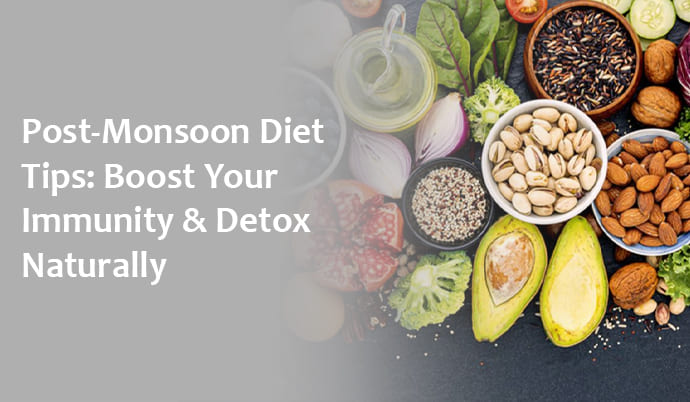
Monsoon in India is ambivalent in nature, a case of experiencing the lush green again, the snug and the chai addiction; and on the other hand, the water-borne infections, the intestinal upsets and the lassitude that follows. Your immune system may be strained by the dewiness, erratic weather, and the multiplication of bacteria and viruses.
And though the skies are all cleared up now, your body may still be in the rituals of the post-monsoon hangover: low energy levels, bad digestion, dull skin, or some in-between random cold. That is your system demanding a clean-up and a reboot, or not, in terms of juice fasts and/or diets.
Hence, one must be aware of an unadulterated, pure, and healthy seasonal diet program which can make you increase your immunity, clear the toxins, and find that get a swing back, like nature had intended.
Hydration Tips After Monsoon
Due to humidity and a decreased thirst, your body does not realise that it loses fluids during the monsoon. However, not any water should be drunk.
Use only warm or room-temperature water to keep digestion vigorous.
A couple of slices of ginger, tulsi or lemon will add a natural post-monsoon detox hint to the water.
Drink herb teas consisting of cumin, coriander, and fennel to detoxify yourself and eliminate bloating.
Avoid cold liquids; they slow down your digestive fire, or agni, which is weakened already at the time of the monsoons.
Best Seasonal Foods for Post-Monsoon Detox
It is not the weight of greasy or ultra-spicy food fare. Your digestive system is still seeking a sattvic, easy, healthy seasonal diet after weeks of heavy digestive work. One must eat:
Vegetables such as lauki (bottle gourd), pumpkin, spinach, beetroot, carrots and sweet potato.
Papaya, pomegranate, guava, and pear fruits are excellent sources of fibre and low in terms of sugar.
Grains such as rice, much-favoured millets (especially kodo or foxtail millet) and moong dal khichdi to support easy digestibility.
Cook your food thoroughly, eat it hot, and combine other ingredients sparingly in a single meal. Practice taking it plain and health-giving.
Natural Immunity-Boosting Superfoods
The post-monsoon period is infamous because of infections, a weak immune system, and slight respiratory complications. Include in your diet the following immunity-boosting foods:
Fermented Foods for Gut Health
Fermented foods will add the much-needed boost to the gut flora after digestive impairments due to monsoons. Include:
A fresh home-made curd or buttermilk (best avoided in a cold or in sinus problems).
Kanji (carrots or mustard seeds probiotic drink.
Moderate amount of pickles (seek less oily, less salty ones).
Do not consume store-bought processed ones. The rule of thumb in fermentation is to use as fresh as possible.
These work harmoniously with a healthy seasonal diet to bring your gut back to life.
Foods to Avoid After Monsoon
Your digestion and protection are not yet fully healed, and it is advisable that you avoid:
Street Food: No, I am sorry, gol gappa lovers. The threat of polluted water and oil remains quite high.
Raw Leafy Vegetables: Are difficult to wash properly after the monsoons; steam / saute them best.
Cold Milk: Similar to milkshakes or air-conditioned yoghurt can bring about the throat.
High Sugar Snacks: Reduce your sugar consumption in order to boost the immune system and limit inflammation.
These choices sabotage your post-monsoon detox and slow down recovery.
Gentle Spices to Aid Recovery
Ayurvedic spices support digestion and immunity:
Jeera (Cumin): Increases the metabolism
Ajwain/Carom seeds: Relieves the bloating
Hing (Asafoetida): Relieves indigestion and gas
Black pepper: Increases absorption of nutrients
Just don't push too hard; your system remains fragile. The trick is called balance.
Soups & Herbal Formulations
Try a simple Ayurvedic Kadha:
Tulsi leaves, grated ginger, turmeric, crushed pepper, and jaggery/honey.
Boil 2 cups of water until reduced by half. Drink warm once a day.
Also enjoy light soups made from bottle gourd, moong dal, spinach, or carrots.
Mindful Eating Habits
Ayurveda claims that assimilation starts in the mind. Eat slower, make a meal of silence (or at least not doomscrolling) and eat until you reach 80% fullness. Late-night eating and being under stress pose a weakening effect on the digestion and invite the accumulation of toxins (ama). Food is your mini meditation, just make it more like a time of meditation, and you will see your body being very appreciative.
Post-monsoon diet tips are like an infrastructure reset button that comes after the rains. There is no better moment than now to detoxify your system, rejuvenate your immune system and establish the rhythm of spring. You do not need special diets or expensive supplements; you need natural, seasonal food, a tiny bit of discipline, and a lot of self-love. Hear the signals of your body, respect the cycles in nature and use food as your medicine. Since there are times when it is your immunity that does not especially require a doctor, but a smarter diet. And if even after following the proper monsoon diet, you observe symptoms of weakened immunity, feel free to consult the specialists and book an appointment at Sir Ganga Ram Hospital today.
FAQs: Post-Monsoon Diet & Immunity
Q1: What foods should I avoid after the monsoon?
Avoid street food, raw leafy vegetables, cold dairy, and sugary snacks as they weaken digestion.
Q2: Which fruits are best for post-monsoon detox?
Papaya, guava, pear, and pomegranate are light, fibre-rich, and immunity-boosting.
Q3: What drinks help in post-monsoon recovery?
Warm water with ginger or lemon, herbal teas, and kadha help detoxify and strengthen immunity.
Q4: Can fermented foods be consumed after monsoon?
Yes, but only fresh homemade curd, buttermilk, or kanji—not processed versions.




